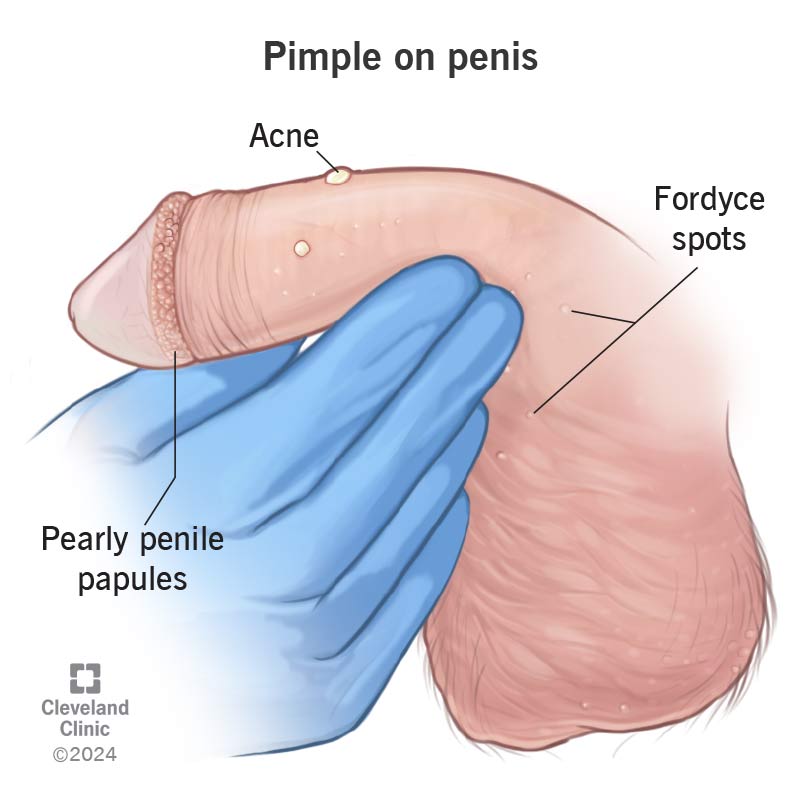Your penis isn’t as common a place for a pimple to develop, but it can happen. Several conditions that look like pimples can develop there, too. A healthcare provider has the training and experience to tell a pimple apart from something else. And they can guide you on what to do about it.
Advertisement
Cleveland Clinic is a non-profit academic medical center. Advertising on our site helps support our mission. We do not endorse non-Cleveland Clinic products or services. Policy

Image content: This image is available to view online.
View image online (https://my.clevelandclinic.org/-/scassets/images/org/health/articles/pimple-on-penis.jpg)
Pimples can happen just about anywhere on your body, including your penis. But several normal skin traits can look like pimples without actually being a condition. And there are several skin conditions that look very similar to pimples, but they need medical care to resolve them.
Advertisement
Cleveland Clinic is a non-profit academic medical center. Advertising on our site helps support our mission. We do not endorse non-Cleveland Clinic products or services. Policy
If the thought of talking to your healthcare provider about a pimple on your penis makes you feel anxious or embarrassed, you’re far from alone. But their job is to care for your health and well-being, not make you feel judged. And if you tell them how you’re feeling about the situation, they can reassure you and help you feel more at ease.
You can have pimple-like bumps on your penis for normal reasons. One example of those are pearly penile papules, a series of tiny bumps around the head of your penis. Another would be having one or more enlarged oil glands on your penis called Fordyce spots. These aren’t actually pimples, but can look a lot like them. Both of these are completely normal and harmless.
Acne is a common cause of pimples on any area of skin that has oil or sebaceous glands (pronounced “she-BAY-shus glands”). It’s especially common to have acne because of hormone changes during puberty. And while it isn’t common to have acne on your penis, it’s still possible.
True pimples happen when something blocks a hair follicle or the connected sebaceous gland. That can happen because of the natural oils in your skin, ingrown hairs or for other reasons. They’re usually harmless unless they become infected.
Advertisement
Other conditions that can cause a pimple-like bump on your penis include:
Any of the above can cause a single, pimple-like bump. But several of them are more likely to cause multiple bumps, a rash or other skin changes.
The treatment for a pimple on your penis depends strongly on what caused it. True pimples usually don’t need treatment and will go away on their own. Others need more specific treatments. Your healthcare provider can tell you what the treatment options are for your case. They can also tell you if self-treating is an option and guide you on how to do that.
The complications from a pimple on your penis also depend on what caused it. Some conditions or issues that look like pimples don’t need any treatment and don’t have any risk of complications. Your healthcare provider is the best person to tell you about the possible complications — if any — and what you can do to limit or avoid them.
If you have a true pimple on your penis, there are some things that you should avoid:
You can’t prevent developing a pimple on your penis with 100% certainty. But you can do several things to reduce your risk of developing a pimple or something that resembles one. They include:
Advertisement
If you have what you think is a pimple on your penis and have any concerns about it, you should talk to your primary care provider. They can either determine what it is or recommend additional lab tests that’ll help them do so.
You think that bump is a pimple but aren’t sure. Regardless of what it is, you’re concerned because of where it is. And you aren’t looking forward to talking to anyone about it, even a healthcare provider.
But if you have what might be a pimple on your penis, a healthcare provider is the best person to talk to about it. They can determine what it is, what’s causing it and what to do about it. Your provider isn’t there to make you feel judged or embarrassed. And they can reassure you and help you understand that issues like this are common and nothing to be ashamed about.
Advertisement

Sign up for our Health Essentials emails for expert guidance on nutrition, fitness, sleep, skin care and more.
Learn more about the Health Library and our editorial process.
Cleveland Clinic’s health articles are based on evidence-backed information and review by medical professionals to ensure accuracy, reliability and up-to-date clinical standards.
Cleveland Clinic’s health articles are based on evidence-backed information and review by medical professionals to ensure accuracy, reliability and up-to-date clinical standards.
Cleveland Clinic’s primary care providers offer lifelong medical care. From sinus infections and high blood pressure to preventive screening, we’re here for you.
